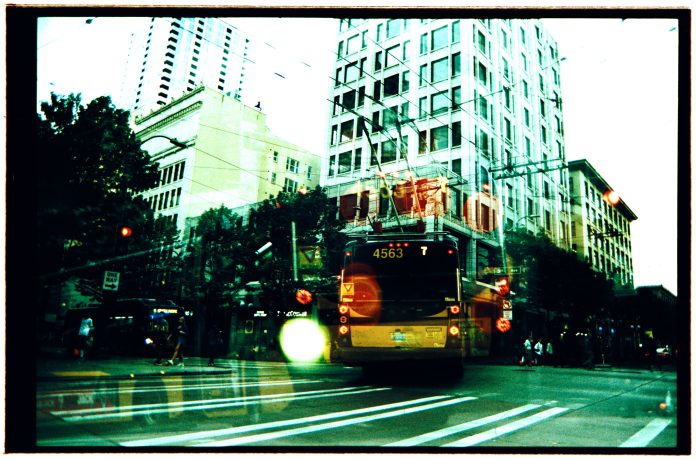
I never look at car wrecks. You end up slowing everything down and risking a second crash through your distraction (yes, this does happen). But most of all, I avoid looking because, well, if I was over there in that wreckage and these were my last moments on earth, I wouldn’t want a bunch of distracted strangers gawking at me like a zoo animal. Death is too significant, too intimate, for such callous ignominy.
So when I saw the other side of 5th and Jackson stacked with ambulances, police, a fire truck, and more, I didn’t bother looking over. I concentrated on getting through safely, thankful I was on the side of the street that was still open. At the zone a middle-aged woman boarded who happened to be Black. Her energy seemed receptive to conversation.
I said, “What happened over there?”
“A stabbing,” she replied. “A Samoan guy stabbed a Black guy.”
“Oh no!”
“Wa’n’t his fault though, the Black guy was actin’ up, runnin’ his mouth you know. They be drinkin’ together everyday.”
“Yeah, they’re out there for sure.”
“He ain’t gon’ die though. They stopped the bleeding. He gon’ pull through.”
“That’s good. Stabbing’s no joke!”
“No it ain’t. I got my finger cut off once, uh accident wit’ a fryer, but they got to it in time, they done sewed it up back together, now it work just fine. I can’t feel this part though, right along the edge.”
“That’s scary. That’s beautiful too though.” What did I mean by that?
“I got my legs busted up once too, doctor done told me I wasn’t gon’ walk again–”
“But here you are!”
“Here I am!”
“I’m so glad it worked out that way with your hand, I mean that it wasn’t worse! I’m so glad they got to it in time!”
“Me too. We got to be thankful, always. And loving, not like these fools out here. It’s about love. Gotta love ‘em no matter what they do to us.”
What bold phrasing, I thought. “Ooh, that’s good. Yeah.”
“No matter how they do. Sometime you gotta love ‘em from a distance though!”
“Ha, you got that right! Give ‘em a lil’ bit o’ space!”
“Takin’ care a yoself, but you can still love ‘em.”
“No matter what they do to us, wow,” I said, reflecting. “I so appreciate you for puttin’ it in those words. I need that reminder!”
“‘Cause sometimes you wanna do that other thing.”
“That can be real tempting.”
“But it gots to be love instead, else those cycles of badness don’t never stop.”
You’ve heard love your enemies before, but her phrasing rebirthed the concept as fresh, new, immediate. In her words I heard the acknowledgement of how hard it can be to do, as well as how necessary.
Before, when we were wronged, we were taught to put up with it. Now, we’re taught to speak up. Sometimes, we’re taught to get angry about it. All that is fine, but I’ve noticed on a longer timeline the latter approach doesn’t work for me. And I don’t mean in the euphemistic sense of it not being my preference, but that it doesn’t actually accomplish anything for me.
I’ve been wronged, as you no doubt have too, in ways that cannot be fixed. But staying angry eventually proves to be little more than a waiting game, and a pointless one at that. On a long enough timeline all angry people would eventually have the thought: Wait a second. Being mad isn’t making me happier. It just perpetuates a lousy mood, which I don’t have time for. While I’m busy stewing how I never deserved this and I hope they burn in hell and so on and so forth, my aggressors have moved on. It’ll be me that gets the ulcer in this scenario, not them. Two things can both be true: a hunger for justice, and the need for sanity.
There’s no one right way to react to being wronged or slighted. If there was, recovery would be a cakewalk. But her way, her nimble, big-hearted, endlessly giving way… I shook my head in admiration and respect. Talk about taking life as it comes and making the best of it.
I wonder what the wronged man across the street would make of this discussion– not now, not tomorrow, but a year or two from now. Five years. Distance helps.
Somewhere deep inside, our best self knows the words, and the calm that comes with them. I struggle mightily at it, as I imagine that man over there will too, but her outlook was the reminder I needed to hear. It is the sentence I’d like to imagine I know, but am so far from actually embodying.
The harder thing, and the right thing, are often the same.
[For more stories from the road, check out my latest book!]
Nathan Vass is an artist, filmmaker, photographer, and author by day, and a Metro bus driver by night, where his community-building work has been showcased on TED, NPR, The Seattle Times, KING 5 and landed him a spot on Seattle Magazine’s 2018 list of the 35 Most Influential People in Seattle. He has shown in over forty photography shows is also the director of nine films, six of which have shown at festivals, and one of which premiered at Henry Art Gallery. His book, The Lines That Make Us, is a Seattle bestseller and 2019 WA State Book Awards finalist.


